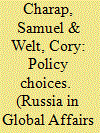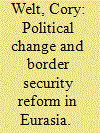| Srl | Item |
| 1 |
ID:
140151


|
|
|
| 2 |
ID:
072882


|
|
|
|
|
| Publication |
2005.
|
| Summary/Abstract |
This article presents four challenges to promoting border security in post-Soviet Eurasia, even in those states that have experienced regime change and profess new interest in constructing sound state institutions. The analysis is drawn from the specific example of Georgia-a major recipient of U.S. border security assistance and the site of several intercepted efforts of radioactive materials trafficking-but it is relevant to other states in the region, as well. The challenges assessed are: (1) the gradual nature of border regime reform, (2) trade-offs that subordinate border reform to other developmental priorities, (3) bureaucratic inertia and politics, and (4) the continued existence of unrecognized territories that lie beyond the reach of the state and of international law.
|
|
|
|
|
|
|
|
|
|
|
|
|
|
|
|
| 3 |
ID:
093715


|
|
|
|
|
| Publication |
2010.
|
| Summary/Abstract |
While the proximate causes of the 2008 Russo-Georgian war have yet to be satisfactorily investigated, an assessment of an earlier occasion of conflict in South Ossetia in 2004 can lay the groundwork for an analysis of the later war. Like the 2008 war, the 2004 conflict was comprehensible on the basis of the ambitious war plans of opposing sides, but it was ultimately rooted in a security dilemma. The conflict thus provides a precedent for considering how a mix of limited offensive intentions, insecurity, uncertainty, and cognitive shortcuts and misperceptions had the capacity to lead to inadvertent war between Russia and Georgia over South Ossetia.
|
|
|
|
|
|
|
|
|
|
|
|
|
|
|
|